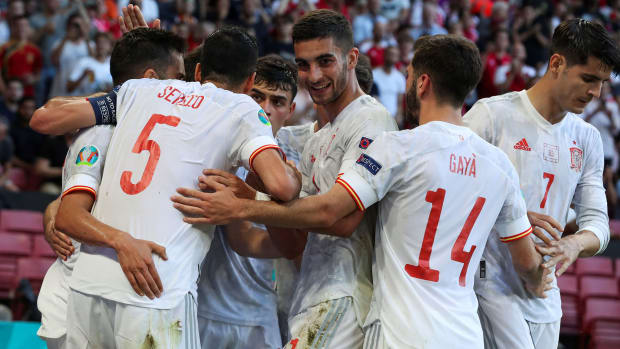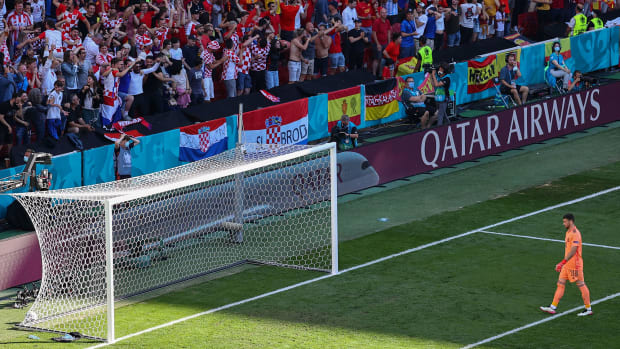Spain overcame an atrocious own goal and two late concessions vs. Croatia to reach the quarterfinals of Euro 2020 in thrilling fashion.
For Spain, the immediate outcome of an astonishingly dramatic tie was a place in the quarterfinals of Euro 2020 against either France or Switzerland. But in the longer term, a 5–3, extra-time win over Croatia may come to seem like a vital game in the rebirth of Spanish football.
It’s not just that this was Spain’s first win in a major tournament knockout game since the final of Euro 2012, it was, beyond the chaos, the style of the win and the spirit it showed in achieving it. After worrying signs of the old sterility in the first half, Spain won in the way that Luis Enrique demands—at least from an attacking point of view. As for the defending, there is work to be done. Luis Enrique said upon taking the job in 2018 that he wanted to add verticality to the possession football for which Spain had become renowned, and ultimately the victory was the result of that. If it could start taking more of its chances and cut out the absurd defensive errors, then this could become a very good side, indeed.

In 19 games since Luis Enrique returned after a four-month hiatus while he dealt with the illness and subsequent death of his 9-year-old daughter, Xana, Spain has lost just once. The results, though, are a curious mixed bag of thumping wins and drab draws. One of those big wins came against Croatia: a 6–0 demotion in Luis Enrique’s first home game in charge just three months after Croatia had been beaten in the World Cup final.
The manager had said after the first two group games—two of those drab draws—that Spanish football was like a bottle of Cava waiting to be opened and, sure enough, the sparkling goodness splurged out with a 5–0 win over Slovakia. But the problem with Cava is that once you’ve popped the cork, the wine tends to go flat pretty quickly. But even away from the metaphor, there were concerns. To what extent was that performance the result of Spain being good, and to what extent of Slovakia being dreadful? For Slovakia was indeed dreadful, devoid of attacking threat, tactically incoherent and apparently entirely dispirited.
The start on Monday was essentially a manifestation of Spanish neurosis. Spain had almost 80% of the possession. The Spanish fullbacks drove high, forcing Croatia deep. There was a lot of sideways passing. Twice Spain should have taken the lead. Koke, seizing on Pedri’s clever pass, hit his shot into the outstretched right boot of Croatia goalkeeper Dominik Livaković. Then, Álvaro Morata, whose misses have drawn a flurry of social media abuse, fluffed a header from a Ferran Torres cross. Just as everybody was settling in for the familiar pattern of Spanish pressure and wastefulness—and Croatian resistance—Croatia struck from nowhere.
Spain had conceded just 12 shots in the group stage, fewer than anybody else. It had still conceded only 12 when Croatia took the lead, with Unai Simón allowing Pedri’s backpass to zip by his foot. It was the ninth own goal of the tournament—or the same amount as there had been in every other previous European Championship combined.

A blip followed, but by the end of the half, Spain had taken control again and was level, with Pablo Sarabia ramming in the rebound after José Gayà’s shot was saved. Croatia, bafflingly, changed its approach and began to press in the second half. That meant there was space behind its defensive line, and immediately Spain was able to exploit it. Rather than passing in front of the defense, Spain was able to pierce it. César Azpilicueta headed in Spain's second—and his first senior international goal—from a Torres cross, and Torres himself added the third from a quickly taken free kick.
It all seemed over at that point, but when Spain isn’t holding possession high up the pitch, it can be vulnerable at the back, its offside trap creaking. Balls into the box spread panic. Croatia substitute Mislav Oršić forced the ball over the line in a scramble after 85 minutes and then, two minutes into stoppage time, Mario Pašalić converted Oršić's cross to take the match into extra time.
In a game of chaos, there should only have been one winner, but Oršić fired a glorious chance over and then Simón, atoning for his earlier gaffe, made an extraordinary save to deny Andrej Kramarić. Those were critical misses. Spain came again, driven largely by Dani Olmo. It became a game less of style than of character, and nobody showed more of that than Morata. Derided for his wastefulness and for being chronically offside when he does score, he smashed Spain in front after 100 minutes, expertly controlling before volleying in with his left from close range. Three minutes later, Mikel Oyarzabal added a fifth, and Spain had done enough.
Spain was through and, perhaps just as important, two players who had made bad mistakes redeemed themselves. Spain had beaten Croatia—and it had beaten its own tendency to self-destruct.
More Euro 2020 Coverage:

Post a Comment
Thanks For Comment We Will Get You Back Soon.